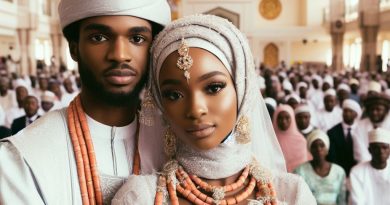Guide to Nigeria’s Marriage Registry Procedures: Step by Step
Last Updated on January 28, 2024
Introduction
Marriage in Nigeria holds profound cultural significance, uniting individuals and families in joyous celebrations.
However, these unions carry legal weight, highlighting the crucial role of the marriage registry in Nigeria.
Importance of Marriage in Nigerian Culture
- Cultural Union: Marriage signifies the blending of diverse Nigerian cultures, fostering unity and continuity.
- Family Bond: It cements familial connections, underpinning the fabric of Nigerian society.
- Rites and Traditions: Rich ceremonies and customs reflect the depth of cultural diversity in Nigerian weddings.
- Celebration: Weddings are grand celebrations, emphasizing love, tradition, and community.
Significance of the Marriage Registry
- Legal Foundation: The marriage registry establishes legal recognition and protection for the union.
- Rights and Benefits: It grants couples legal rights and access to benefits, including inheritance and property.
- Documentation: It provides official documentation of the marriage, serving as a vital record.
- Cross-Cultural Unification: The registry merges diverse traditions under a legal umbrella, unifying Nigeria’s cultural tapestry.
In the upcoming sections, we will guide you through the step-by-step procedures of Nigeria’s marriage registry, making your union both culturally significant and legally recognized.
Preparing for Marriage Registry
Legal Requirements for Getting Married in Nigeria
Before embarking on the marriage registry procedures in Nigeria, it’s crucial to understand the legal requirements involved.
These requirements ensure that the marriage is recognized and valid under Nigerian law.
Age Restrictions
One of the primary legal requirements for getting married in Nigeria is meeting the age restrictions.
Both partners must be at least 21 years old to enter into a marriage contract.
Anyone under the legal age cannot get married without parental or guardian consent.
Consent Requirements
In cases where one or both parties involved are younger than the marriageable age, consent from the parents or legal guardians is vital.
This consent can be obtained through the appropriate legal channels and must be presented during the registry process.
Documentation Needed
When preparing for the marriage registry, certain documents are essential to ensure a smooth and successful process.
These documents include:
- Birth Certificates: Original copies of birth certificates for both individuals are required.
- Passports: Valid Nigerian passports or any other government-issued identification are necessary.
- Proof of Address: Documents showing the current address of both parties, such as utility bills or driver’s licenses.
- Statutory Declarations: Affidavits confirming the marital status of both individuals.
It’s essential to gather the required documents and ensure they are valid and up to date before proceeding with the marriage registry.
The Importance of Premarital Counseling
In addition to fulfilling the legal requirements, it is highly recommended to undergo premarital counseling before getting married in Nigeria.
Premarital counseling is an essential step in preparing for a successful and fulfilling marriage.
Undertaking premarital counseling allows couples to address key aspects of married life, laying a solid foundation for their relationship.
Some benefits of premarital counseling include:
- Improved Communication: Counseling sessions provide an opportunity to enhance communication skills and learn effective ways to express thoughts and feelings.
- Conflict Resolution: Couples can learn healthy strategies for resolving conflicts and managing disagreements, promoting a harmonious relationship.
- Establishing Expectations: Counseling helps couples to discuss and align their expectations regarding various aspects of marriage, such as financial matters, career goals, and raising children.
- Building Trust: Through counseling, couples can develop trust and deepen their emotional connection, fostering a strong and lasting bond.
- Healthier Adjustment: Premarital counseling equips couples with the necessary tools and insights to handle the challenges that come with marriage, leading to a healthier adjustment to married life.
In short, when preparing for the marriage registry in Nigeria, it is crucial to understand and fulfill the legal requirements, including age restrictions, consent requirements, and obtaining the necessary documentation.
Additionally, couples should consider the importance of premarital counseling as a means of building a strong foundation for their married life.
By taking these steps, couples can start their journey towards a successful and fulfilling marriage.
Choosing the Type of Marriage Ceremony
In Nigeria, couples have several marriage ceremony options:
Customary Marriage
- Based on ethnic traditions.
- Requires registration for legal recognition.
- Preserves cultural heritage and involves the community.
Islamic Marriage
- Follows Islamic teachings.
- Recognized under Sharia law.
- Allows adherence to religious beliefs.
Christian Marriage
- Conducted in a church.
- Offers legal recognition and spiritual blessings.
- Gains support from the church community.
Regardless of the type chosen, all marriages must be registered at the marriage registry for legal recognition.
Couples should consider their beliefs, culture, and preferences when deciding.
Consulting with family, religious leaders, and legal professionals is advisable.
Couples should also understand the specific requirements for each ceremony and complete pre-marital counseling or registration when necessary.
This approach ensures a meaningful and legally recognized union that aligns with their values.
Read: Communication: The Pillar of Nigerian Marriage Success
Finding and Visiting the Marriage Registry
In order to proceed with your marriage registration, you need to find and visit the nearest marriage registry office.
Here’s how you can easily locate and navigate the registry office:
Locating the Nearest Marriage Registry Office
- Start by conducting an online search using keywords like “marriage registry office” and the name of your city or town.
- Check the official website of the Ministry of Interior or the local government for a list of authorized marriage registry offices.
- Ask your friends, family members, or colleagues who have recently gone through the marriage registration process for recommendations or directions.
- If all else fails, contact the Ministry of Interior or the local government’s customer service for guidance on locating the nearest registry office.
Steps to Visit the Registry Office
Appointments
- Before visiting the registry office, it is advisable to schedule an appointment to ensure a smooth and efficient process.
- Call the registry office or book an appointment online if such a system is available.
- Choose a convenient time and date for you and your partner to visit the office.
- Make sure to take note of the appointment details, including the name of the officer you will be meeting.
Inquiry about Specific Requirements
- Prior to your appointment, it’s essential to inquire about any specific requirements or documents needed for your marriage registration.
- Contact the registry office by phone or email to get accurate information about the necessary paperwork.
- Prepare the required documents in advance to eliminate any potential delays or complications during your visit.
- Make a checklist to ensure you have all the necessary documents when you visit the registry office.
Remember, each country and even different states within a country may have varying marriage registry procedures.
Therefore, it is important to follow the specific guidelines provided by the Nigerian Ministry of Interior or the local government.
Following these steps will make your visit to the marriage registry office a smooth and hassle-free experience.
Read: Setting and Achieving Goals as a Married Couple in Nigeria

Application Process
To register your marriage, you must submit specific forms and documents to the marriage registry:
- Intention to Marry Form: Declare your intent to marry with basic details.
- Affidavit of Marital Status: Confirm eligibility and no current marriages.
- Proof of Identification: Present valid ID, like passports or national identity cards.
Accurate submission is crucial for these reasons
- Legal Compliance: Ensures a lawful marriage meeting all requirements.
- Verification of Eligibility: Confirms both partners are eligible for marriage.
- Preventing Fraud: Mitigates fraudulent marriages and deception attempts.
- Smooth Processing: Facilitates efficient processing of your application.
- Avoiding Delays: Prevents delays or application rejection due to missing or incorrect information.
- Ensuring Official Recognition: Accurate documentation guarantees legal recognition and associated rights.
Additional tips
- Double-Check: Verify that all information matches your supporting documents.
- Validity: Ensure identification documents are valid at the time of application.
- Translation: Translate non-English documents as required.
- Witnesses: Confirm if witnesses are needed for form signing.
- Guidance: Seek help from the registry or legal experts for clarity.
- Submission: Follow specified submission instructions, whether online or in-person.
Providing precise information and complete forms and documents ensures a smooth application process and legal marriage recognition.
Read: The Journey from Wedding Day to Years of Unity in Nigeria
Interview and Investigation
In this step, you will undergo an interview process with the registry officials to ensure that your marriage meets the legal requirements in Nigeria.
Verification of Identities
The first part of the interview process involves the verification of your identities.
The registry officials will check your identification documents such as passports, birth certificates, and any other relevant documents to confirm your identity.
It is important to ensure that you have all the necessary documents with you during this interview to avoid any delays or complications.
Make sure to bring original copies as well as photocopies of your identification documents.
Questioning Regarding Intentions to Marry
The registry officials will also ask you some questions regarding your intentions to marry.
This is to ensure that you are getting married willingly and without any coercion or fraud.
They will want to know if both parties are of legal age to marry and if you are freely entering into the marriage contract.
You may be asked questions such as how you met your partner, how long you have known each other, and whether you have any previous marriages or children from previous relationships.
It is important to answer these questions truthfully and honestly.
Purpose of the Investigation into the Couple’s Background
The purpose of the investigation into the couple’s background is to verify the information provided during the interview and to ensure that there are no legal impediments to the marriage.
The registry officials may conduct a background check on both individuals to confirm their marital status, criminal records, or any other relevant information.
This is to protect both parties and to prevent any potential fraudulent marriages.
It is important to note that this investigation is a standard procedure and should not be seen as an invasion of privacy.
It is in place to safeguard the integrity of the marriage registry and to ensure that all marriages are legally valid.
The interview and investigation process at the marriage registry is an essential step in getting married in Nigeria.
It aims to verify the identities of the couple, inquire about their intentions to marry, and investigate their backgrounds.
It is important to cooperate with the registry officials during this process and provide them with all the necessary information and documents.
Remember, this step is in place to protect both parties and to ensure that the marriage is legally valid.
Once this step is successfully completed, you can proceed to the next step, which is the issuance of the marriage certificate.
Read: Understanding the Deep Meaning of Marriage Messages
Waiting Period and Publication of Notice
In Nigeria’s Marriage Registry Procedures, there is a waiting period before the marriage can take place.
During this time, couples are required to publish a notice of their intent to marry.
Discuss the Waiting Period Before the Marriage Can Take Place
After completing the necessary documentation and submitting it to the marriage registry, couples must wait for a specified period before their marriage can legally take place.
This waiting period allows the registry to process and verify the information provided.
The waiting period may vary depending on the specific marriage registry, but it typically ranges from 21 to 28 days.
During this time, couples should refrain from making any wedding arrangements or bookings to ensure compliance with the legal requirements.
Explain the Requirement of Publishing a Notice of Intent to Marry
As part of the marriage registration process, it is necessary to publish a notice of intent to marry.
This requirement helps to ensure transparency and provides an opportunity for any objections to be raised if there are legal impediments to the marriage.
The notice must be published in a newspaper or other publication approved by the marriage registry.
It should include details such as the full names of the intending couple, their addresses, occupations, and the date of the intended marriage.
This notice allows the public to become aware of the upcoming marriage and provides an opportunity for objections to be raised if necessary.
Importance of This Step
The waiting period and publication of notice step is essential as it helps to ensure that marriages are conducted legally and with full transparency.
It provides an opportunity for any objections to be raised, such as if one of the parties is already married or if there are other legal impediments to the marriage.
This step also supports the principle of informed consent, as it gives the public an opportunity to voice any concerns before the marriage takes place.
It helps to protect individuals from entering into marriages that may be invalid or against their will.
Timelines and Deadlines to Be Aware Of
Couples should be aware of the specific timelines and deadlines associated with the waiting period and publication of notice step.
They should allow enough time for the notice to be published and for any potential objections to be raised and addressed before proceeding with their wedding plans.
It is recommended to contact the specific marriage registry where the marriage will be registered to obtain accurate information regarding the waiting period and publication requirements.
This will ensure compliance with the legal procedures and prevent any unnecessary delays or complications.
The waiting period and publication of notice step are significant components of Nigeria’s Marriage Registry Procedures.
They contribute to the transparency and legality of marriages, allowing time for verification and addressing any objections that may arise.
Couples should adhere to the specified timelines and deadlines to ensure a smooth and legally compliant marriage registration process.
Delve into the Subject: Inter-tribal Marriages in Nigeria: Challenges and Rewards
Marriage Ceremony
In Nigerian registry marriages, the couple exchanges vows and rings, followed by signing the marriage register:
- Exchange of Vows and Rings: Publicly declaring commitment in front of witnesses.
- Registrar’s Guidance: Couple stands before the registrar, affirming their lifetime commitment.
- Ring Exchange: Groom places a wedding band on the bride’s finger, symbolizing eternal love.
- Signing the Register: Both bride and groom, along with witnesses, sign the legal document.
Customs and traditions enhance the ceremony
- Traditional Elements: Traditional attire, music, dances, and rituals enrich the event.
- “Spraying” Tradition: Guests shower money, symbolizing blessings and prosperity.
- Marriage Dance: Couple and guests perform joyful traditional dances, fostering celebration.
- Prayers and Blessings: Loved ones offer heartfelt prayers, providing a strong foundation for the couple.
Therefore, Nigerian registry marriages blend vows, rings, legal formalities, and rich cultural traditions, symbolizing a lifelong commitment.
Registration and Issuance of Marriage Certificate
Registering your marriage in Nigeria is essential for legal recognition and various benefits.
To obtain a marriage certificate, follow these steps
- Submit required documents and payment.
- Follow up with the registry office.
- Attend a briefing with your spouse.
- Answer questions about your personal details and marriage.
- Obtain the marriage certificate after a successful briefing.
- Pay necessary issuance fees.
- Provide additional required documents.
- Wait for printing and authentication.
- Collect the certificate on the appointed date.
The marriage certificate holds immense legal significance
- Proof of Marriage: It’s essential for official purposes, like opening joint bank accounts, insurance, and visa applications.
- Protection: It safeguards both partners in case of separation or divorce by providing evidence of a legal union.
- Security and Peace of Mind: The certificate allows confident assertion of marital rights and prevents disputes about marriage validity.
- Preservation: Keep multiple copies stored securely to ensure easy access when needed.
In general, registering your marriage and obtaining a marriage certificate is crucial for legal recognition and protecting your rights as a married couple in Nigeria.
Conclusion
The marriage registry process in Nigeria follows a strict step-by-step procedure.
It is crucial to adhere to these procedures to ensure a legally recognized marriage.
In recap, the procedures include obtaining and completing the marriage declaration form, registering the form at the marriage registry, and attending a marriage interview.
Afterward, a notice of marriage is posted for 21 days, and the couple is issued a marriage certificate upon presentation of necessary documents.
Following these procedures is of utmost importance as it guarantees legal recognition and protection for the married couple.
It ensures that their rights, benefits, and obligations are upheld by the law.
Failure to follow the procedures may result in a marriage not being recognized, causing complications in various legal aspects.
In addition to the steps mentioned, there are a few additional tips to ensure a smooth registry process.
Firstly, it is advisable to gather all the necessary documents beforehand, such as birth certificates and evidence of termination of any previous marriages.
This helps to avoid delays and complications.
Furthermore, couples should consider seeking legal advice or consulting with a marriage registry officer to clarify any doubts or concerns.
It is also important to be punctual to all appointments and respond promptly to any requests for further information to prevent delays in the process.
By carefully following the step-by-step procedures and considering these recommendations, couples can navigate Nigeria’s marriage registry system seamlessly and ensure their marriage is legally recognized.
This will provide them with peace of mind and the legal protection they deserve as they embark on their marital journey.


